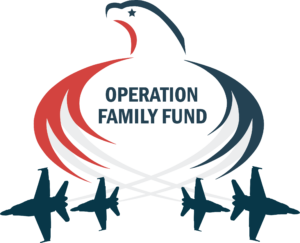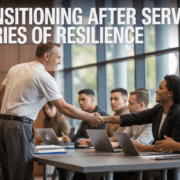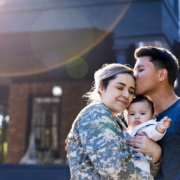Transitioning After Service: Stories of Resilience & Support with OFF
Leaving military service marks one of life’s most significant career shifts. For veterans navigating this complex journey, transitioning after military service brings unique challenges that civilian job seekers rarely face.
This guide is for veterans considering their next chapter, family members supporting a transitioning service member, and anyone curious about the real experiences behind military to civilian transition. We’ll also explore how organizations like Operation Family Fund (OFF) provide crucial support during this pivotal time.
We’ll dive into authentic veteran transition stories that showcase both struggles and breakthroughs. You’ll discover how veteran community support creates networks that make all the difference. Finally, we’ll share actionable military transition resources and strategies for building veteran resilience that help achieve lasting success beyond the uniform.
Every veteran’s path looks different, but no one has to walk it alone.
Understanding the Military-to-Civilian Transition Challenge
Common Obstacles Veterans Face When Leaving Service
The military to civilian transition presents unique challenges that many veterans struggle to navigate alone. Service members spend years operating within a highly structured environment where hierarchy, mission clarity, and team dynamics define daily life. Suddenly finding themselves in the civilian world can feel like learning an entirely new language.
Career translation tops the list of obstacles. Military occupational specialties don’t always have obvious civilian counterparts, leaving veterans wondering how to communicate their skills to potential employers. A combat medic might excel at emergency medical procedures but struggle to explain how those skills apply to a hospital setting. Meanwhile, leadership experience gained from managing troops in high-stress situations doesn’t automatically translate to a resume.
Financial adjustment creates another hurdle. The steady paycheck, housing allowances, and comprehensive benefits that military life provides disappear overnight. Veterans must learn to budget without these safety nets, often while supporting families who’ve grown accustomed to military benefits. The post-military career change process can involve salary cuts or entry-level positions despite years of service experience.
Social connections also suffer during the transition after military service. The tight-knit army community, which provided instant camaraderie and shared understanding, is replaced by civilian networks that operate differently. Veterans often report feeling isolated, misunderstood, or disconnected from their new environments.
Emotional and Psychological Barriers to Successful Reintegration
Beyond practical challenges, veterans face deep emotional hurdles that can derail their transition efforts. Identity crisis ranks among the most significant barriers. After years of identifying as a soldier, sailor, airman, or marine, veterans must reconstruct their sense of self in civilian terms. This identity shift affects everything from daily routines to core values and purpose.
Loss of mission and structure creates psychological discomfort. Military service provides clear objectives, defined roles, and immediate feedback systems. Civilian life offers more freedom but less direction, leaving some veterans feeling adrift without the framework that once guided their decisions. The absence of this structure can trigger anxiety, depression, or feelings of purposelessness.
Hypervigilance and trust issues developed during service can interfere with civilian relationships and workplace dynamics. Veterans might struggle with crowded spaces, sudden noises, or situations that feel unpredictable. These responses, while protective during deployment, can create barriers to forming new professional and personal connections.
Survivor’s guilt affects veterans who transitioned while friends remained deployed or who lost fellow service members. This guilt can manifest as reluctance to celebrate personal achievements or difficulty accepting help from others. Some veterans feel they don’t deserve success or happiness, sabotaging their own transition efforts.
The Importance of Structured Support Systems
Successful military to civilian transition requires intentional support structures that address both practical and emotional needs. Veterans benefit from programs that understand military culture while providing tools for civilian success. These support systems serve as bridges between military experience and civilian opportunities.
Mentorship programs connect transitioning veterans with those who’ve successfully navigated similar challenges. Peer mentors offer practical advice while providing emotional support from someone who truly understands the military experience. This connection helps veterans feel less alone in their struggles and more confident in their ability to succeed.
Professional development resources help veterans identify transferable skills and market themselves effectively to civilian employers. Career counseling, resume writing workshops, and interview preparation designed explicitly for veterans can make the difference between unemployment and meaningful employment.
Mental health support acknowledges that transition challenges often require professional intervention. Counseling services, support groups, and wellness programs create safe spaces for veterans to process their experiences and develop coping strategies for civilian life.
Educational opportunities provide pathways for veterans to gain new skills or credentials that enhance their civilian marketability. Whether through degree programs, certification courses, or technical training, education helps veterans feel more prepared for their new careers.
How OFF Addresses Unique Veteran Needs
OFF recognizes that veteran community support requires specialized approaches tailored to military experiences and values. The organization creates environments where veterans feel understood and accepted while providing practical tools for successful transition.
The program emphasizes peer-to-peer support, connecting veterans with others at various stages of their civilian journey. This approach leverages the military value of teamwork while building networks that extend beyond the program itself. Veterans learn from each other’s successes and challenges, creating a collaborative learning environment.
OFF addresses the identity crisis many veterans face by helping them identify their core values and strengths beyond their military roles. Through self-assessment exercises and guided reflection, veterans discover how their military experience shapes their civilian potential rather than limiting it. This reframing helps veterans approach their transition with confidence rather than anxiety.
The organization provides military transition resources that address both immediate needs and long-term goals. Emergency assistance helps with urgent financial or housing needs, while career development programs focus on sustainable employment opportunities. This dual approach prevents veterans from getting stuck in survival mode while building foundations for future success.
Veteran resilience-building forms a core component of OFF’s methodology. Rather than treating veterans as victims of difficult transitions, the program emphasizes their inherent strengths and capacity for growth. Veterans learn to view challenges as opportunities for development rather than insurmountable obstacles.
OFF also understands that family dynamics change during military transitions. Spouses and children face their own adjustment challenges, and the organization provides resources for entire families rather than just the veteran. This holistic approach recognizes that successful veteran transitions often depend on family stability and support.
The program’s flexibility accommodates the diverse needs of different veteran populations. Combat veterans might need different resources than those who served in support roles. Recent veterans face different challenges than those who’ve been out of service for years. OFF tailors its approach to meet veterans where they are in their transition journey rather than applying one-size-fits-all solutions.
Real Stories of Veteran Transformation Through OFF
Career pivots from military to civilian leadership roles
Marcus Thompson spent twelve years as an Army logistics officer, coordinating supply chains across three deployments. When he left the service, he worried his skills wouldn’t translate to civilian companies. Through OFF’s career transition program, Marcus discovered that his ability to manage complex operations under pressure was exactly what tech startups needed. Today, he leads operations for a growing e-commerce platform, earning 40% more than his military salary while using the same strategic thinking that served him overseas.
Sarah Chen’s transition from Navy intelligence analyst to cybersecurity consultant wasn’t straightforward either. The jargon was different, the corporate culture felt foreign, and imposter syndrome crept in during her first few interviews. OFF’s mentorship program paired her with a veteran who’d made a similar jump five years earlier. With guidance on translating military experience into business language, Sarah now runs her own cybersecurity firm, protecting small businesses from digital threats while employing three other veterans.
These veteran transition stories highlight how military leadership skills – decision-making under pressure, team coordination, and strategic planning – become invaluable assets in civilian careers. OFF’s approach focuses on helping veterans recognize these transferable skills rather than starting from scratch.
Overcoming mental health challenges with community support
James Rodriguez returned from Afghanistan carrying invisible wounds that made his military-to-civilian transition feel impossible. Panic attacks during job interviews, difficulty sleeping, and a constant sense of hypervigilance made networking events unbearable. Traditional therapy helped, but connecting with other veterans through OFF’s peer support groups created the breakthrough he needed.
“Talking to someone who’d been there, who understood why I jumped every time a car backfired – that changed everything,” James reflects. His OFF support group became his anchor, meeting weekly to share struggles and victories. Group members celebrated when James landed his first civilian job as a project manager, and they were there six months later when workplace stress triggered old patterns.
The veteran community support model works because shared experience creates instant trust. When Maria Santos struggled with depression after leaving the Air Force, her OFF mentor didn’t just offer generic advice – she shared her own story of dark moments and gradual healing. This connection helped Maria realize that asking for help wasn’t a weakness; it was a strategy.
Research shows that veterans in peer support programs have 60% better outcomes in addressing mental health challenges. OFF’s groups provide safe spaces where military culture meets civilian healing, creating bridges between worlds that often feel disconnected.
Building new professional networks and relationships
Professional networking felt like foreign territory for David Kim after eight years as a Marine mechanic. Military connections were strong but narrow – he knew how to fix helicopters, not how to schmooze at corporate happy hours. OFF’s networking workshops taught him that building relationships didn’t require pretending to be someone else.
David’s first OFF networking event paired him with established professionals who genuinely wanted to help veterans succeed. Instead of awkward small talk, conversations focused on problem-solving and shared challenges. When David mentioned his expertise in maintaining complex equipment under extreme conditions, a construction company executive immediately saw applications for their overseas projects.
“I thought networking meant wearing a suit and talking about golf,” David laughs. “Turns out, it’s about showing people how your skills solve their problems.” Six months later, David manages maintenance operations for three international construction sites, leveraging connections made through OFF events.
The program’s approach emphasizes authentic relationship-building over transactional interactions. Veterans learn to frame their military experience in terms of value delivered to civilian organizations, creating genuine connections rather than forced conversations.
Finding purpose beyond military service
Military service provides a clear mission and purpose—protecting the country—creating meaning that civilian jobs sometimes struggle to match. Lisa Patel, a former Army medic, felt lost working in corporate healthcare administration. The bureaucracy frustrated her, and she missed the direct impact of saving lives in field hospitals.
OFF’s purpose-finding workshops helped Lisa identify what aspects of military service energized her most: immediate problem-solving, team collaboration, and helping people during critical moments. This reflection led her to emergency management, where she now coordinates disaster response efforts for three counties. Her military training in triage and crisis management translates perfectly to coordinating resources during natural disasters.
“I’m still serving, just in a different uniform,” Lisa explains. Her work evacuating families during floods and coordinating relief efforts provides the same sense of mission she felt overseas, proving that changing her post-military career doesn’t mean abandoning service entirely.
Robert Chang’s journey from Special Forces to youth counselor shows another path to purpose. Military precision and leadership skills that seemed irrelevant in civilian contexts became powerful tools for mentoring at-risk teenagers. His ability to remain calm under pressure and set clear boundaries creates safe spaces for kids who’ve faced trauma similar to what he experienced overseas.
These transformations demonstrate that veteran resilience building often involves reframing military values rather than replacing them. Purpose-driven careers become sustainable when they align with the service mindset that drew people to military careers initially.
The Role of Community in Veteran Success
Peer mentorship programs that create lasting bonds
The bond between veterans who’ve walked similar paths creates something powerful that can’t be replicated in traditional counseling settings. When experienced veterans guide newcomers through the military to civilian transition, they speak a language that goes beyond words. These mentors understand the sleepless nights, the identity struggles, and the weight of leaving behind a brotherhood that defined their lives for years.
Peer mentorship programs within veteran community support networks pair service members with those who’ve successfully navigated their post-military career change. These relationships often start with practical advice about resume writing or job interviews, but quickly evolve into deep friendships built on shared experiences. Veterans find themselves opening up about challenges they’ve never discussed with anyone else, knowing their mentor has faced the same crossroads.
The beauty of these programs lies in their authenticity. When a former Marine tells a newly transitioned soldier that feeling lost is normal and temporary, it carries weight because that Marine remembers their own first civilian job interview. These connections frequently outlast the formal mentorship period, creating lifelong support systems that extend far beyond career guidance.
Group therapy sessions that foster healing
Group therapy creates a unique environment where veterans can drop their guard and acknowledge the emotional toll of transitioning after military service. In these circles, the pressure to appear strong and unaffected melts away. Veterans discover they’re not alone in struggling with civilian workplace dynamics or feeling disconnected from family members who can’t relate to their military experience.
The magic happens when veterans realize that the sergeant sitting across from them battles the same hypervigilance in crowded spaces, or that the Navy veteran beside them also struggles with finding purpose in civilian work after years of mission-driven service. These sessions provide a safe harbor where military transition challenges can be discussed openly without judgment or the need to explain military culture to outsiders.
Professional facilitators guide these discussions, but often the most healing moments come from veteran-to-veteran exchanges. Someone shares a breakthrough about managing anger, and others lean forward, hungry for strategies that come from real experience. The group becomes a laboratory for testing new approaches to civilian life, with built-in accountability partners who understand the stakes.
Networking events that open career opportunities
Professional networking takes on new meaning when veterans connect with others who understand military experience. These events go beyond typical business card exchanges, creating opportunities for meaningful conversations about translating military skills into civilian success stories. Veterans learn to articulate their value proposition while connecting with employers who recognize the unique strengths military service develops.
Many veterans discover that their most valuable connections come from other service members who’ve established themselves in various industries. A former Air Force logistics specialist might connect with an Army veteran who’s now in supply chain management, opening doors that traditional networking couldn’t provide. These relationships often lead to referrals, mentorship opportunities, and insights into company cultures that value military experience.
Smart networking events for veterans include workshops on translating military experience for civilian audiences, industry-specific meetups, and panels featuring successful veteran entrepreneurs. Attendees leave with more than business cards – they gain confidence in their ability to contribute meaningfully to civilian organizations and build professional relationships based on mutual respect and shared values.
Family support resources for complete transition success
Military families transition together, yet family members often feel forgotten in programs focused solely on the veteran. Spouses who’ve managed households during deployments now navigate their own identity shifts as their veteran partners search for a new purpose. Children who’ve moved frequently and lived within military communities suddenly find themselves in unfamiliar civilian environments.
Comprehensive family support addresses these ripple effects of transition. Support groups for military spouses provide spaces to discuss their own career aspirations, often put on hold during military moves. These programs help spouses rebuild professional networks and explore opportunities that were impossible during military life. Children benefit from programs that help them process the change from military to civilian schools and communities.
Family counseling sessions that focus on the military-to-civilian transition help everyone adjust their expectations and communication patterns. Military families learn to navigate civilian social situations together, from neighborhood barbecues to parent-teacher conferences, where their military background might set them apart. When entire families receive support, veterans find their home environment becomes a source of strength rather than additional stress during transition.
Creating safe spaces for sharing experiences
The veteran community thrives when safe spaces exist for authentic conversation without civilian observers who might not understand military culture. These environments allow veterans to share stories that might sound alarming to those unfamiliar with military life, from combat experiences to the intense camaraderie that civilian workplaces rarely match.
Coffee meetups, online forums, and veteran center gatherings serve as informal decompression zones where military humor, direct communication styles, and references to military life flow naturally. Veterans don’t need to translate their experiences or soften their language for civilian sensibilities. They can discuss the guilt of surviving when others didn’t, the struggle to find work that feels meaningful after serving their country, or the frustration with civilian bureaucracy that moves too slowly.
These spaces often become incubators for veteran-led initiatives and businesses. When veterans feel comfortable sharing their struggles and dreams with others who understand, collaborative solutions emerge. When someone mentions a problem they’re facing, three other veterans offer resources, connections, or partnership opportunities. The safe space becomes a launching pad for innovation and mutual support that extends far beyond the meeting room.
Practical Resources and Tools for Smooth Transition
Resume Writing and Interview Preparation Assistance
Crafting a civilian resume after military service can feel like translating a foreign language. Many veterans struggle to convert their military experience into terms that civilian employers understand. OFF’s resume writing services help bridge this gap by working one-on-one with veterans to highlight transferable skills and quantify achievements in business-friendly language.
Professional resume writers who specialize in military to civilian transition understand how to transform military roles into compelling civilian narratives. They know that a squad leader’s experience managing personnel under pressure translates perfectly to team management and crisis leadership skills that companies desperately need.
Interview preparation goes beyond basic questions and answers. Veterans learn to tell their stories in ways that resonate with civilian hiring managers, focusing on problem-solving abilities, leadership under pressure, and adaptability. Mock interviews help build confidence while addressing common concerns like overqualification or cultural fit.
Education and Skill Development Opportunities
The transition period offers a unique window to develop new skills or deepen existing ones. OFF connects veterans with educational programs that align with their career goals, from technical certifications to advanced degrees. Many programs offer flexible scheduling that accommodates job searches and family responsibilities.
Trade schools and vocational programs provide fast tracks to stable careers in fields like healthcare, technology, and skilled trades. These programs often value military experience and offer accelerated paths for veterans who already possess discipline and strong work ethics.
Professional development workshops cover everything from project management certification to digital marketing skills. Veterans discover that their military background gives them a solid foundation for learning new technologies and business practices.
Financial Planning and Benefits Navigation Guidance
Military transition resources include comprehensive financial planning that addresses the shift from steady military pay to civilian employment cycles. Veterans learn to budget for potential gaps between jobs and understand how different compensation structures work in the civilian world.
Benefits navigation can be overwhelming, with veterans needing to understand how to maximize their GI Bill benefits, VA disability compensation, and healthcare options. Expert counselors help veterans make informed decisions about when to use their benefits to optimize their value.
Financial advisors who specialize in veteran needs understand unique challenges like deployment savings, military retirement benefits, and the complexities of maintaining security clearances. They provide realistic timelines for financial stability during career transitions.
Job Placement Services Tailored to Veteran Strengths
Veteran-focused job placement services understand that military experience creates unique value propositions. These services maintain relationships with employers who actively seek veteran employees, recognizing their reliability, leadership potential, and ability to work under pressure.
Placement specialists match veterans not just with available positions, but with company cultures that value military traits. They understand which industries translate best for different military occupational specialties and can guide veterans toward roles where they’ll thrive rather than survive.
Many placement services offer ongoing support after job placement, helping veterans navigate their first civilian workplace experiences and addressing any adjustment challenges that arise during those crucial first months.
Building Long-Term Resilience After Service
Developing civilian identity while honoring military experience
The journey of building a civilian identity doesn’t mean erasing your military past—it means integrating those valuable experiences into your new chapter. Many veterans struggle with this balance, feeling like they must choose between their military identity and their civilian future. The truth is, your military experience forms the foundation of who you are, and those skills translate powerfully into civilian life.
Start by identifying the core values and strengths you developed during service. Leadership, discipline, problem-solving under pressure, and teamwork aren’t just military traits—they’re career superpowers in any field. Companies actively seek these qualities, and recognizing this helps you approach job interviews and networking with confidence rather than uncertainty about your background.
Creating a civilian identity also means exploring interests and passions that the military structure may have put on hold. This might involve pursuing hobbies, education, or career paths that weren’t possible during active duty. Many veterans discover entrepreneurial spirits, artistic talents, or desires to serve their communities in new ways.
The key is viewing this transition as evolution, not replacement. Your military service remains a source of pride and strength while you build new aspects of your identity. This balanced approach helps prevent the identity crisis many veterans face and creates a more complete, authentic sense of self.
Maintaining mental and physical wellness routines
Physical and mental wellness routines that worked in military life often need adjustment for civilian reality. The structured fitness schedules, regular medical care, and built-in support systems of military life don’t automatically translate to civilian environments. Creating sustainable wellness habits requires planning and adaptation.
Physical fitness remains crucial, but your approach may need to shift. Without mandatory PT sessions, you’ll need to build personal motivation and find activities you genuinely enjoy. This might mean trading military-style workouts for hiking, rock climbing, martial arts, or team sports that provide both fitness and social connection. The goal is to find sustainable activities that fit your civilian schedule and lifestyle.
Mental wellness requires equal attention. The high-stress environments of military service can leave lasting impacts that civilian life doesn’t automatically heal. Regular check-ins with mental health professionals, whether through VA services or private providers, help you process experiences and develop coping strategies for civilian stressors.
Sleep, nutrition, and stress management also need conscious attention. Without military dining facilities and structured schedules, veterans often struggle with irregular eating patterns and disrupted sleep cycles. Developing consistent routines around meals, sleep, and relaxation helps maintain the stability your body and mind need to thrive.
Building these routines takes time and experimentation. What matters is starting somewhere and adjusting as you learn what works in your new civilian context.
Contributing to veteran advocacy and support initiatives
Giving back to the veteran community creates purpose and connection while building long-term resilience after military service. When you help other veterans navigate their own transitions, you reinforce your own growth while creating meaningful impact. This contribution doesn’t require grand gestures—small actions often make the most significant difference.
Mentoring newly transitioning veterans provides natural opportunities to share your experience and lessons learned. Whether through formal programs or informal relationships, your insights about job searching, dealing with civilian workplace culture, or managing transition stress can guide others through similar challenges. Many veterans find this mentoring relationship beneficial for themselves as well as for those they help.
Advocacy work allows you to address systemic issues affecting veteran communities. This might involve volunteering with organizations focused on veteran employment, homelessness, mental health, or education. Your firsthand experience gives weight to advocacy efforts and helps ensure programs actually meet veteran needs.
Community involvement also takes local forms. Veterans often become active in community organizations, schools, or civic groups, bringing military values of service and leadership to civilian causes. This involvement helps you build civilian networks while maintaining a connection to service-oriented values.
The act of helping others reinforces your own resilience and creates a sense of continued mission beyond military service. Many veterans discover that supporting their fellow service members becomes a defining part of their civilian identity.
Passing knowledge forward to newly transitioning veterans
Sharing your transition experience with newly separated veterans creates a lasting impact while strengthening your own resilience journey. Every veteran’s path is unique, but common challenges and successful strategies emerge that can help others avoid unnecessary struggles. Your knowledge becomes a valuable resource for the veteran community.
Formal mentoring through organizations like OFF provides structured opportunities to guide transitioning veterans through career decisions, workplace adaptation, and personal challenges. These relationships often evolve beyond professional guidance into lasting friendships and support networks. The structured nature helps ensure both mentor and mentee benefit from clear expectations and regular interaction.
Informal knowledge sharing happens through veteran networks, online communities, and casual conversations. Sometimes, a simple discussion about interview techniques, workplace culture, or managing civilian schedules provides exactly the insight a struggling veteran needs. Your willingness to share experiences openly creates safe spaces for others to ask questions and admit difficulties.
Professional speaking opportunities allow a broader impact. Many veterans become speakers at transition workshops, career fairs, or veteran events, sharing their stories and practical advice with larger audiences. These presentations help normalize transition struggles while providing concrete strategies for success.
Writing about your experience—whether through blogs, social media, or formal publications—extends your reach to veterans who might not access traditional support networks. Your honest account of challenges and victories helps others feel less alone in their journey.
The process of articulating your lessons learned also deepens your own understanding of your growth and strengthens your confidence in your civilian path.
Moving from military service to civilian life brings real challenges, but the stories shared here show that transformation is absolutely possible with the proper support. OFF has proven that veterans don’t have to navigate this journey alone – having a community that truly understands makes all the difference. The practical tools and resources available through these programs give veterans concrete ways to rebuild their lives and find new purpose.
The path forward isn’t always smooth, but building long-term resilience starts with taking that first step and connecting with others who’ve walked the same road. If you’re a veteran facing this transition, reach out to organizations like OFF that specialize in veteran support. Your service gave you strength and skills that translate into civilian success. Sometimes, you just need the right community to help you see that potential and make it real.
As a leading Wounded Veteran Charity, Operation Family Fund is committed to helping Injured Veterans and their families regain stability through financial relief, recovery programs, and ongoing community support. Discover how we’re making an impact through initiatives like Is the PACT Act Failing Our Heroes? The Truth About Veterans’ Benefits and other vital efforts aimed at honoring and uplifting those who have sacrificed for our freedom.






